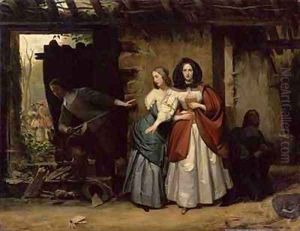Francois-Augustin Desmoulins Paintings
François-Augustin Desmoulins was a French artist born in the mid-18th century who specialized in painting. Unfortunately, his name is not widely recognized in the annals of art history, and as such, detailed information about his life and works are somewhat scarce in comparison to other, more well-documented artists of his time. This scarcity is often the case with lesser-known artists of the period, whose biographies have not been the subject of extensive research or who may not have had a significant impact on the art movements of their time.
Desmoulins would have lived through a very turbulent period in French history, which included the latter part of the reign of Louis XV, the entire reign of Louis XVI, the French Revolution, and the rise of Napoleon Bonaparte. These events inevitably influenced the artists of the time, either through the subject matter of their art or through the patronage they received.
Being an artist in 18th-century France, Desmoulins would likely have been trained in the academic tradition, which was governed by the Académie Royale de Peinture et de Sculpture. This institution dictated the artistic standards of the time and controlled the official art exhibitions, known as the Salon. Artists like Desmoulins would have aimed to exhibit their works at the Salon to gain recognition and commissions from patrons.
Unfortunately, without more specific information on Desmoulins' individual works, influence, or contributions to the art world, it is challenging to provide a detailed biography. If François-Augustin Desmoulins did create notable works or had a significant career, the records may be lost, or his contributions might be overshadowed by his contemporaries, such as Jacques-Louis David, Jean-Honoré Fragonard, and Jean-Baptiste Greuze.
In summary, while François-Augustin Desmoulins was indeed a painter of the 18th-century French school, the lack of substantial records about his life and career prevents a more comprehensive biography. His experience as an artist during one of the most tumultuous periods in French history would no doubt have been compelling, but the specifics, unfortunately, remain largely unknown. His death in 1804 would mark the end of his life during a period that had seen the complete transformation of French society and the arts.
